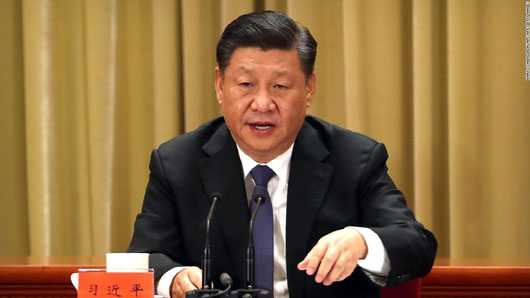CELEBRATING 20 YEARS OF EXCELLENCE: Countdown: Top stories of 2018
by WorldTribune Staff, January 2, 2019
In a sinister start to 2019, Chinese supreme leader Xi Jinping bluntly threatened to invade Taiwan but promised to reward the Republic of China if it places itself under Beijing’s rule.
Meanwhile, North Korean leader Kim Jong-Un in his New Year’s address exploited the advantage provided by the leftist government in Seoul and vowed to press for North-South reunification on Pyongyang’s terms.
Promising economic gifts to Taiwan, Xi in a Jan. 2 address said “with the great motherland’s support, Taiwan compatriots’ welfare will be even better, their development space will be even greater.”

But Xi reiterated that China was prepared to use military force to reign in Taiwan.
“We make no promise to renounce the use of force and reserve the option of taking all necessary means,” Xi said. In what many observers said was a shot at the United States, Xi added that the issue is China’s internal affair and that it would permit “no external interference.”
Related: Kim launches peace offensive aimed at splitting U.S.-South Korean alliance, Jan. 1, 2019
“We are willing to create broad space for peaceful reunification, but will leave no room for any form of separatist activities,” Xi said.
Xi pointed to the Hong Kong model of “one country two systems” as a solution for Taiwan.
Taiwanese President Tsai Ing-wen immediately rejected Xi’s proposal.
“The vast majority in Taiwan resolutely oppose ‘one country, two systems’. This is the ‘Taiwan consensus,’ ” Tsai told reporters during a news conference at the Presidential Palace in Taipei. “We call on China to bravely step forward for democracy, for only by doing so can it truly understand the people of Taiwan’s thinking and insistence.”
Meanwhile, thousands of demonstrators marched in Hong Kong on Jan. 1 to protest what they say is the Communist Party’s crackdown on local freedoms. The protesters demanded full democracy, fundamental rights, and some even called for independence from China.
Over the past year, reports say that China has jailed Hong Kong activists, banned a pro-independence political party, expelled a Western journalist, and barred democracy activists from contesting local elections.
“Looking back at the year that passed, it was a very bad year … The rule of law in Hong Kong is falling backwards,” said Jimmy Sham, one of the protest organizers.
The former British colony returned to Chinese rule in 1997 under a “one country, two systems” formula, with the promise of a high degree of autonomy and universal suffrage as an “ultimate aim.”
But China still considers Hong Kong to be an inalienable part of its territory, and denounces “separatists” as a threat to national sovereignty.
“There will be continuous suppression on the Hong Kong independence movement, but the movement will grow stronger and stronger,” said Baggio Leung, an independence leader who said several of his members had been harassed by purported “triads” or gangsters, before the march.
In 2018, Hong Kong authorities banned, on national security grounds, the Hong Kong National Party for its pro-independence stance.
Journalist Victor Mallet was also effectively expelled from Hong Kong soon after he hosted a talk at a press club by the head of the National Party.
In Pyongyang, North Korean dictator Kim Jong-Un sent a letter to South Korean President Moon Jae-In on Dec. 30 expressing his continued desire to visit Seoul and indicating his regret that the historic visit could not take place by the end of 2018 as hoped for by Moon, according to a Geostrategy-Direct.com report.
Kim followed the letter with a hard-hitting New Year’s address, aimed at the South Korean government, that placed heavy emphasis on North-South reunification on Pyongyang’s terms and without U.S. interference.
“As long as North and South promise to go on the path of peace and prosperity, we should not allow joint military exercises with foreign powers that are the source of tension in the Korean Peninsula,” Kim said.
South Korea’s leftist leader visited Pyongyang last year and unilaterally reached a series of agreements with Kim that were detrimental to the Washington-led denuclearization process.
Check Out Geostrategy-Direct __________ Jump Start the U.S. Media
